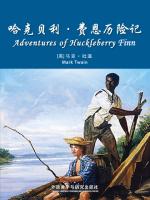读后感
用户757450
An Odyssey Through Time and Space: A Review of "The Adventures of
Huckleberry Finn" Introduction In the realm of American literature,
few works have left as indelible a mark as Mark Twain's "The
Adventures of Huckleberry Finn." This seminal novel, first
published in 1884, transcends the boundaries of genre, blending elements
of adventure, comedy, social commentary, and moral exploration into a
narrative that remains as vibrant and relevant today as it was over a
century ago. Twain's masterpiece is not merely a tale of two boys'
journey down the Mississippi River; it is a profound reflection on human
nature, slavery, and the complexities of moral growth. This review
delves into the multifaceted layers of "Huckleberry Finn,"
examining its narrative structure, character development, thematic
depth, and its enduring legacy in the annals of American literature.
Narrative Structure and Voice The narrative of "Huckleberry
Finn" is unique in its use of the first-person point of view, with
the protagonist, Huck, serving as the narrator. This choice grants the
story an intimate and authentic tone, as Huck's voice—raw, unpolished,
and occasionally vulgar—mirrors the oral tradition of storytelling
prevalent in frontier America. Huck's narrative style is characterized
by a blend of naivete and insightfulness, creating a tension that
challenges readers to reconcile his apparent simplicity with the
profound truths he reveals about society and morality. Twain's decision
to frame the narrative through Huck's eyes allows for a candid
exploration of race, class, and social norms. Huck's unfiltered
perspective on slavery, for instance, is both shocking and enlightening.
His initial acceptance of the institution gradually evolves through his
interactions with Jim, a runaway slave, revealing a nuanced portrayal of
conscience and ethical awakening. This evolution is mirrored in Huck's
language, which shifts from colloquial slang and racial epithets to a
more reflective and compassionate tone as he grapples with the moral
implications of his actions and surroundings. Character Development:
Huck and Jim At the heart of "Huckleberry Finn" are the
characters of Huck and Jim. Huck, the anti-hero, embodies the spirit of
rebellion and individualism. His rejection of societal conventions,
particularly those related to education and religion, positions him as a
figure of nonconformity. However, Huck's journey is one of
self-discovery, as he learns to navigate the complexities of morality
and empathy. His relationship with Jim serves as a catalyst for this
growth, forcing Huck to confront his prejudices and ultimately redefine
his sense of self and others. Jim, on the other hand, represents the
humanity and dignity often denied to slaves. His character is marked by
resilience, kindness, and a deep sense of loyalty. Jim's wisdom and
moral clarity often contrast sharply with Huck's more impulsive and
self-centered nature, serving as a guiding force that helps Huck mature.
Their bond transcends racial boundaries, illustrating the potential for
genuine friendship and mutual respect across social divides. Thematic
Exploration: Morality, Freedom, and Identity "The Adventures of
Huckleberry Finn" is rich in thematic exploration, with morality,
freedom, and identity emerging as central concerns. The novel poses
profound questions about the nature of right and wrong, particularly in
the context of slavery. Huck's internal conflict over aiding Jim's
escape underscores the moral ambiguity inherent in a society that
sanctions one person's ownership of another. Twain's portrayal of Huck's
struggle to reconcile his conscience with societal norms underscores the
novel's broader critique of American hypocrisy and moral inconsistency.
Freedom is another recurring theme, symbolized by the Mississippi River,
which serves as both a physical and metaphorical conduit for Huck and
Jim's journey. The river embodies the promise of escape, adventure, and
self-determination, yet it is also a place of danger and uncertainty.
This duality reflects the complexities of freedom itself—a cherished
ideal often fraught with challenges and sacrifices. Identity, too, is a
theme that runs throughout the novel. Huck's quest for self-definition
is intertwined with his rejection of societal expectations and his
evolving relationship with Jim. Similarly, Jim's journey is one of
reclaiming his humanity and asserting his agency in a world that has
denied him both. Through their shared experiences, Huck and Jim
challenge conventional notions of identity, demonstrating that true
freedom and self-realization are achievable only when one is able to
transcend societal constraints and embrace one's true nature. Legacy and
Controversy "The Adventures of Huckleberry Finn" has left an
indelible mark on American literature, influencing generations of
writers and readers. Its innovative narrative techniques, complex
characterizations, and profound thematic exploration have earned it a
place among the greatest American novels. However, the novel's legacy is
not without controversy. Twain's use of racial epithets and dialect, reflective



 京公网安备 11010802032529号
京公网安备 11010802032529号